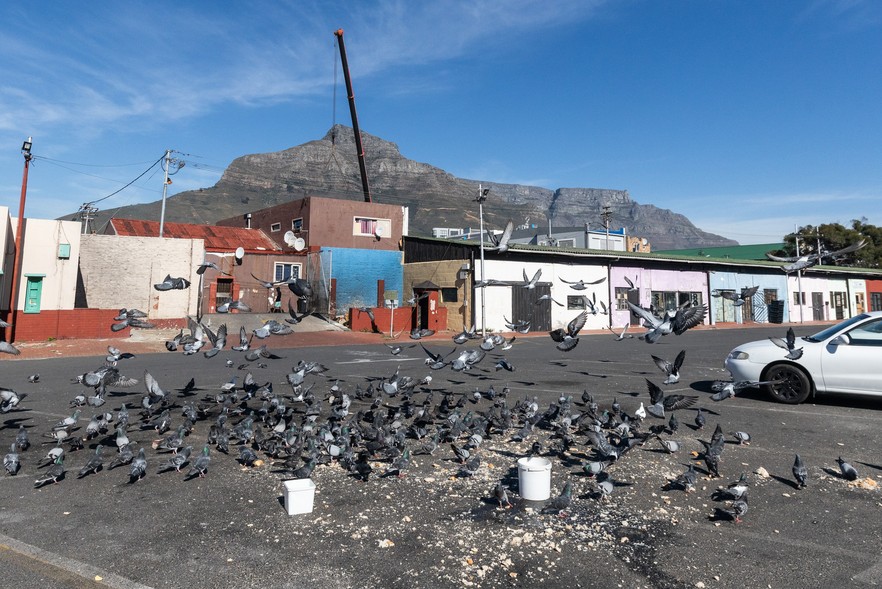
21 May 2024
The last four traders at the Salt River market are facing eviction. The site will be used for affordable housing.
Owners of the last four businesses operating at the historic Salt River market in Cape Town say they will contest their eviction in court. The site is to be used for the development of affordable housing.
When GroundUp visited the market in 2022, there were 17 businesses.
In 2022, Mayor Geordin Hill-Lewis announced that the City of Cape Town had tabled the release of land for two major social housing projects which included the development and construction of the Salt River Market precinct.
Mayco Member for Human Settlements Carl Pophaim said the development is expected to provide 1,000 homes: 300 social housing units, 700 affordable housing units, “and many opportunities for small businesses”.
He said the development is expected to cost about R700-million.
Pophaim said only fresh produce traders will be accommodated in the development.
“This is in line with the historical context of the market,” he said.
Traders say the stray cats living at the market keep the rats at bay. They are worried about the fate of the cats when construction starts on the site.
In a letter sent to other businesses on 26 July 2023, the City told the owners to vacate the premises by 26 October 2023. The City said it would not provide them with alternative premises and advised them to do so on their own.
Some left, but others stayed. The City has since issued them with an eviction notice. But the traders have contested it and the matter will be heard in court in June.
Pophaim said construction was expected to begin in July, but it could be delayed if the remaining traders do not leave.
When GroundUp visited the market on Tuesday, most of the shops were closed. Some had their windows boarded up and some traders were moving their goods.
Sashen Padayachi has had an automotive business for over six years from Salt River market. He is battling to find new premises for his workshop.
Sashen Padayachi, who runs an automotive business, said he had to lay off four employees. He works alone now.
“Because of the uncertainty over our premises, I had to let all of them go. I would rather they find a different job than sit and wait around and possibly lose their jobs,” he said.
Padayachi said he had spent the last two years looking for alternative premises big enough to accommodate several vehicles but without success.
“We don’t have an objection to the development or to moving, because we know that the City is doing something good. But you can’t take bread and butter from one person and put them on the street to give others bread and butter,” said Padayachi.
Arthur de Bruyn, who runs a catering business for ships at Cape Town harbour with his wife Bonita, said the traders didn’t expect to win in court. “But we might just prolong our efforts to stay here because some people still don’t know where they are going.”
Their business has been operating from the market since 2003.
“The writing is on the wall for all of us, except for the fruit and veg traders. They have been offered alternative accommodation in the hall across from the market,” he said.
“Currently, we deliver from here to the harbour which is about five minutes away depending on the traffic. So, our expenses are going to increase,” he said.
Arthur De Bruyn owns Maverick Trading. He has been at the Salt River Market for over 20 years.
Bonita De Bruyn said although she supports the development, “the City should have at least offered us alternative rental space.”
“These talks have been in the works for nearly eight years. But there was one obstacle after the other … Nothing happened and it went quiet for years. But now it’s picked up momentum and we can see that this is going to happen,” said De Bruyn.
De Bruyn said she and the traders who have already left are considering hosting a farewell. “It’s been really difficult. We’ve built really good relationships with other traders over the years and they’ve become our friends. But it’s the end of an era.”
The families living in the 21 former horse stables next to the Salt River Market will also need to move before construction begins.
The informal settlement, called the “Stables” or “Stalle”, is situated on City-owned land.
Pophaim said the families there had been told they would have to move and they were cooperating. The City was identifying land for them to move to. The time frame for relocating the families, Pophaim said, will depend on the City securing land.
The City of Cape Town is identifying land for the families from the old stables to move to.